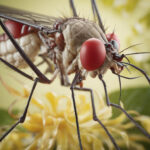Diversifying Protein to Secure Our Future: The Power of Innovation
In the quest for a sustainable and resilient food system, the topic of protein diversification has emerged as a crucial aspect of ensuring food security for the future. With the global population steadily increasing and the environmental impact of traditional animal agriculture becoming more apparent, innovators in the agrifood sector are turning to alternative protein sources to drive the transformation towards a more equitable and sustainable food system.
One organization at the forefront of this movement is EIT Food, a European Knowledge and Innovation Community that is dedicated to promoting a healthy and sustainable food system. Through their initiatives, EIT Food is harnessing the power of agrifood innovation to explore new sources of protein and develop novel solutions that can help diversify our protein supply.
By expanding the range of protein sources available, we can reduce our reliance on resource-intensive livestock farming and address key challenges such as food insecurity, climate change, and biodiversity loss. Alternative protein sources, such as plant-based proteins, algae, fungi, and cultured meat, offer a more sustainable and environmentally friendly way to meet the growing global demand for protein.
Plant-based proteins, for example, have gained significant traction in recent years as consumers become more conscious of the environmental and ethical implications of their food choices. Products like plant-based burgers, dairy alternatives, and meat substitutes are not only more environmentally friendly than their animal-derived counterparts but also offer a nutritious and delicious alternative for consumers.
Algae and fungi are also emerging as promising sources of protein, with the potential to be cultivated using fewer resources and in a more sustainable manner than traditional crops. These organisms are rich in essential nutrients and can be used in a variety of food products, from supplements to plant-based meats, contributing to a more diverse and resilient protein supply chain.
Cultured meat, produced by cultivating animal cells in a lab setting, is another innovative solution that holds great promise for the future of protein production. By growing meat from cells rather than raising and slaughtering animals, cultured meat offers a more ethical and sustainable alternative to conventional meat production, with a significantly lower environmental footprint.
The shift towards a more diversified protein supply is not only beneficial for the environment but also presents a significant economic opportunity for businesses and entrepreneurs. The market for alternative proteins is rapidly expanding, driven by consumer demand for sustainable and ethically produced food products. Companies that invest in research and development in this area stand to gain a competitive edge in the evolving food market.
In conclusion, the diversification of protein sources is a key strategy in building a more sustainable, resilient, and equitable food system for the future. By embracing innovation in the agrifood sector and exploring new sources of protein, we can reduce our environmental impact, improve food security, and meet the changing demands of consumers. The power of innovation in diversifying protein is not only essential for securing our future but also holds the potential to transform the way we produce and consume food.
The post “Diversifying Protein to Secure Our Future: The Power of Innovation” originally appeared on Innovation News Network.
protein diversification, sustainable food system, alternative proteins, agrifood innovation, food security












